Nursing: Strikes 'because patients are dying', says nurse
- Published
- comments
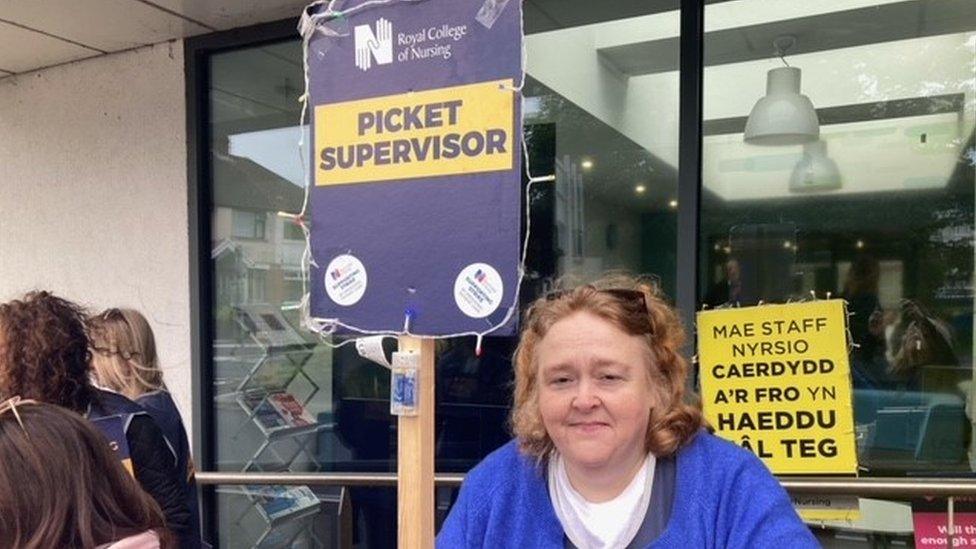
Katherine Davies said she would still encourage people to consider a career in nursing
A nurse has said strikes are taking place because "patients are dying".
Cardiff-based Katherine Davies is on the picket line and said there simply are not enough staff.
Nurses across nearly all parts of Wales will strike for 12 hours on Tuesday and Wednesday in an ongoing dispute over pay.
The industrial action means thousands of planned care appointments will be impacted.
The Royal College of Nursing (RCN) Wales' chief Helen Whyley said members needed "more commitments" from the Welsh government.
She added that the ballot for further action would reopen in July.
The Welsh government said it was "disappointed" that strike action was continuing.
The lack of staff makes it difficult to spot when patients deteriorate, which can be a matter of life and death in cases like sepsis, Ms Davies said.
Ms Davies, who works at the University Hospital of Wales in Cardiff, said: "We just don't have enough staff."
Ms Davies, who has been a nurse for 32 years, said the pressures have meant she has "neglected" her patients.
BBC Wales health correspondent Jenny Rees explains the situation
She is striking on the picket line with fellow Cardiff and Vale workers outside the hospital.
"I have not given them the attention they deserved," she said.
"I have thought about them on the drive home and what I haven't been able to do. That's not a good feeling.
"Five, ten years ago it was different. Now, we have to choose, who is the least ill.
"The least ill person might just want someone to sit with them at the start of the day, to talk through their diagnosis, their treatment but we can't do that.
"It wasn't perfect in the past but we could wash patients, do something and put moisturiser on someone's face or legs, we can't do that any more. We're lucky if we can wash their faces."
People are picketing across Wales, including at Bronglais Hospital in Aberystwyth, Ceredigion.
Aneurin Bevan health board, in south east Wales, is the only one not to be affected by the strikes.
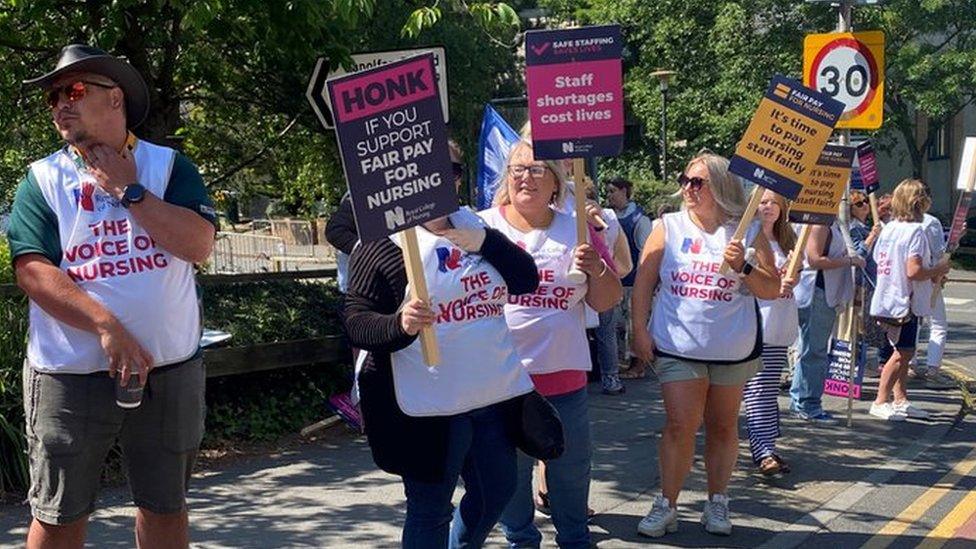
People are picketing across Wales including Bronglais Hospital, Aberystwyth
Marcus Longley, a former chairman of Cwm Taf Morgannwg University Health Board, told that there is a "real toxic mix" of factors that have come together, from pay, working conditions and staffing issues.
"There is a danger of salami slicing - you chop a little bit off and a little bit off - and you end up with an institution that nobody is proud of," he said.
"That is a recipe for constant crisis."
The strike is due to take place between 07:00 and 19:00 BST on both days, though there are exemptions where certain units will be staffed.
These include critical care units, dialysis and chemotherapy services, life-threatening cancer treatments, neonatal and paediatric intensive care units and standalone paediatric emergency departments.
Night duty levels of staffing will also be in place for A&E, 24-hour in-patient areas and community services.
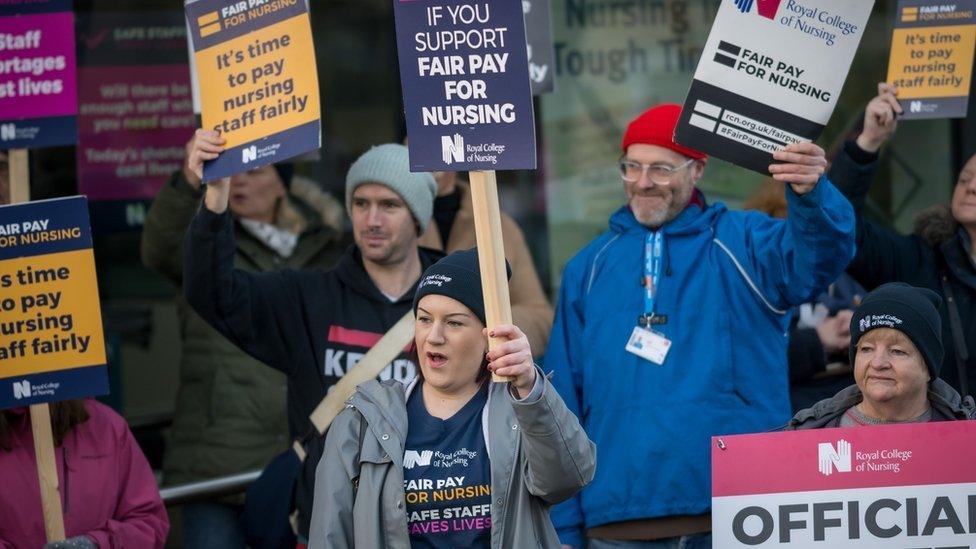
Nurses in most parts of Wales are set to strike again on 6 and 7 June
It means elective and routine procedures involving Royal College of Nursing members - such as operations and outpatient appointments - will not take place.
The RCN in Wales has more than 17,000 members but it is not clear how many will withdraw labour during the strike.
Managers are planning around that uncertainty, which is why many clinics and procedures will not have been booked for the two days.
'Better and bigger commitments'
Helen Whyley of the RCN said members wanted better working conditions and a further rise in pay.
"We need some more commitments from the Welsh government about things that will influence and affect nursing," she said.
"It keeps people retained, it makes them want to come into the profession. But alongside that we're also looking for better and bigger commitments about terms and conditions, recruitment and retention, things that will keep nurses working not just today or tomorrow, but for the next five, 10, 15 years.
"My members don't want to be out on picket lines, they want to be doing what they do well and that's looking after patients."
An improved pay deal for most NHS staff was recently announced by the Welsh government, but RCN members in Wales voted to reject the offer and these two days of industrial action were scheduled.
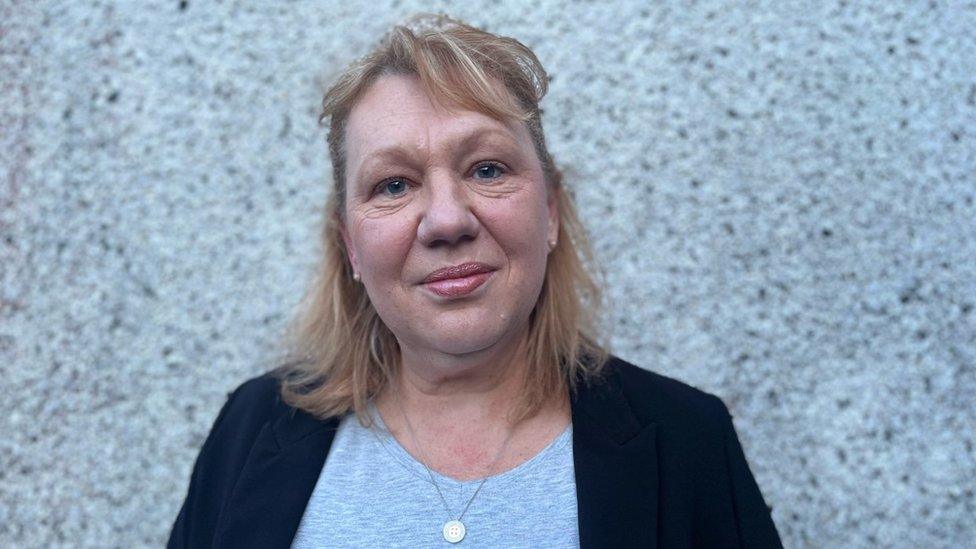
RCN Wales chief Helen Whyley says members have not taken the decision to strike lightly
The union went on strike twice in December last year, but suspended further action in February while talks with the Welsh government continued.
Their current mandate for strike action runs out on 1 August, though the RCN said it had already set plans in motion to renew that support among its membership.
Ms Whyley added that members were "not doing this lightly".
"My members don't want to be out on picket lines, they want to be doing what they do well and that's looking after patients," she said.
But she added that any solution needed to mean "they'll go to work and they won't be the only person on duty that's substantive, that they'll take their pay packets and be able to pay to feed their families and take their children out.
"And that they'll have a profession that other people want to join."
A Welsh government spokesperson said: "While we recognise the strength of feeling among members, we are disappointed that strike action is continuing despite the collective decision to accept the Agenda for Change pay offer by the Wales Partnership Forum Business Committee.
"We are working with the NHS, unions and partners to ensure life-saving and life-maintaining care is provided during the industrial action, patient safety is maintained and disruption is minimised.
"But it is vital that all of us to do all we can to minimise pressure on our health service during the industrial action and consider carefully what activities we take part in."
The Welsh government urged people to call 999 if "in immediate danger" but to use the NHS 111 website or a local GP or pharmacy for health advice "where there is no immediate threat to life".


When nurses took to the picket lines in December, the wider mood was a little different.
They were soon followed by two other large unions representing ambulance staff. Discontent hung heavy in the air.
But six months on and a majority of unions representing healthcare workers have accepted the improved pay offer from the Welsh government - for both the current and previous financial years.
While all health workers, aside from doctors, therefore benefitted from the deal, the RCN said its members were not bound by that collective decision - and were still exercising their right to strike.


STEELTOWN MURDERS: Three murders - unsolved but never forgotten
ROOKIE NURSES: Fresh out of uni and in at the deep end

- Published24 January 2023
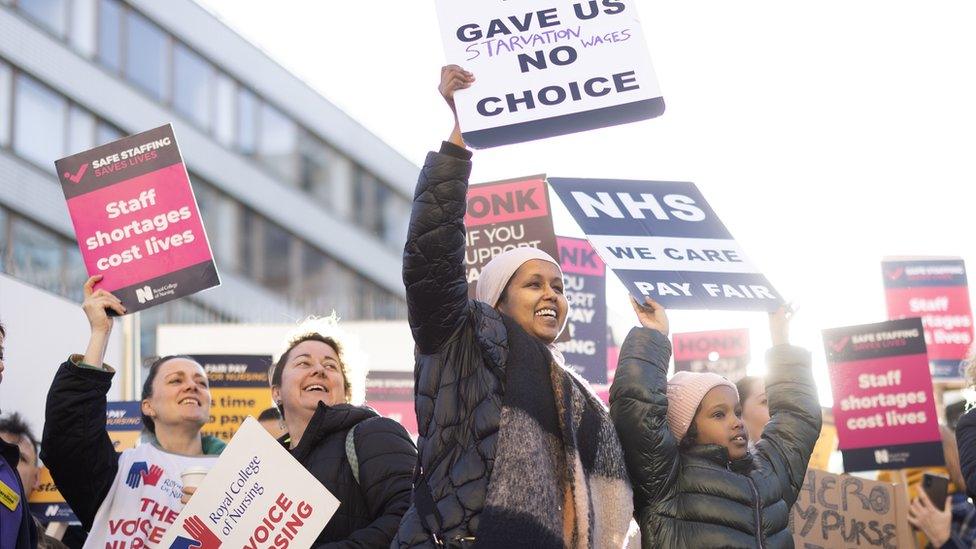
- Published24 May 2023
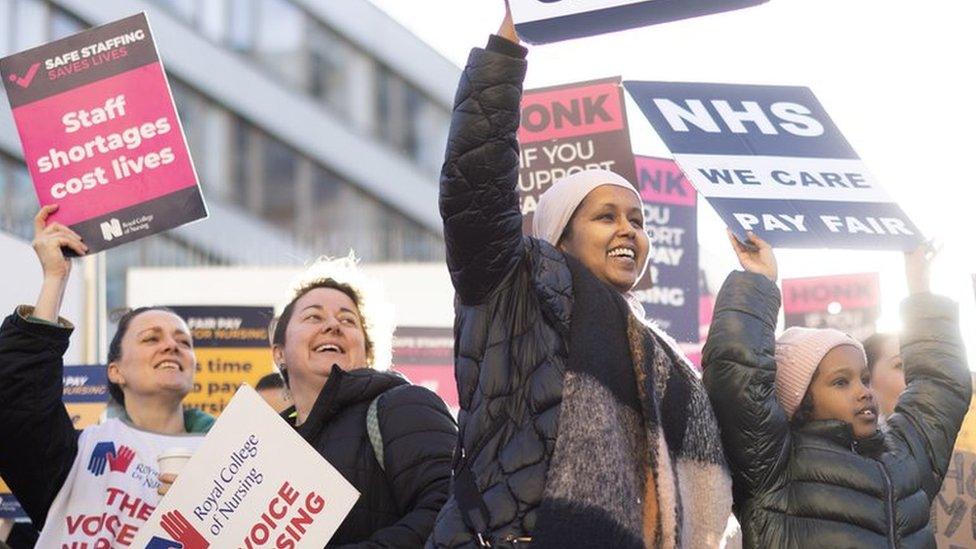
- Published3 February 2023
